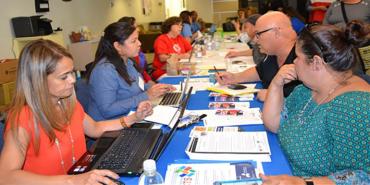
Florida was preparing for an influx of some 100,000 Puerto Rican refugees after Hurricane Maria. But two months after the monster storm paralyzed virtually anything normal about life on the island, Puerto Rican arrivals in the Sunshine State have already exceeded 200,000 -- and the surge is continuing.
Maria isn't the only force responsible.
While President Trump was scorched by the press for mentioning it, the island’s budgetary crisis has long been a reality. A steady tide of transplants has been pouring into Florida in recent years because of economic conditions on the island. Maria only exacerbated the exodus. The impact on the state of Florida is direct, and immediate.
In the days following the storm’s impact, Gov. Rick Scott began lending aid to the island. He also commenced setting up programs and set aside funding for assisting the arrivals. Those efforts will need expansion, as the Florida Division Of Emergency Management has estimated 208,000 residents have passed through airports in Miami, Orlando, and Tampa, just since October.
The Governor’s Office tabulated 8,500 students have enrolled in state schools from Puerto Rico and the Virgin Islands. The Department of Education and other agencies are moving quickly to implement programs that will ease the burden on the state system. For example, a lengthy list of state universities has waived out-of-state tuition and enrollment fees for new students displaced by the hurricane.
Scott declared a state of emergency in the state of Florida to specifically deal with the influx of the arrivals. There has already been a reallocation of state surplus funds, and in his new budget proposal he called for money to help both Florida residents needing storm aid, and programs dealing with the new Puerto Rican residents.
The largest fiscal question mark concerns federal assistance. Congress is already dealing with how much financial and infrastructure aid it will allocate for the recent rash of natural disasters. Florida has been designated over $600 million in relief to damaged regions. The state will receive a portion of the more than $7 billion in relief to go out to areas affected by storms in Texas, Puerto Rico, and the Virgin Islands, as well as sections of California dealing with massive wildfires in 2017.
Given that estimates of transplanted residents have already doubled since the state budget first was discussed publicly, expect a recalibration of the outlay for storm assistance to dominate the 2018 legislative session. How much, and where those funds will come from, are likely to be a continuing challenge.
Brad Slager is a Fort Lauderdale freelance writer who wrote this story exclusively for Sunshine State News. He writes on politics and the entertainment industry and his stories appear in such publications as RedState and The Federalist.


